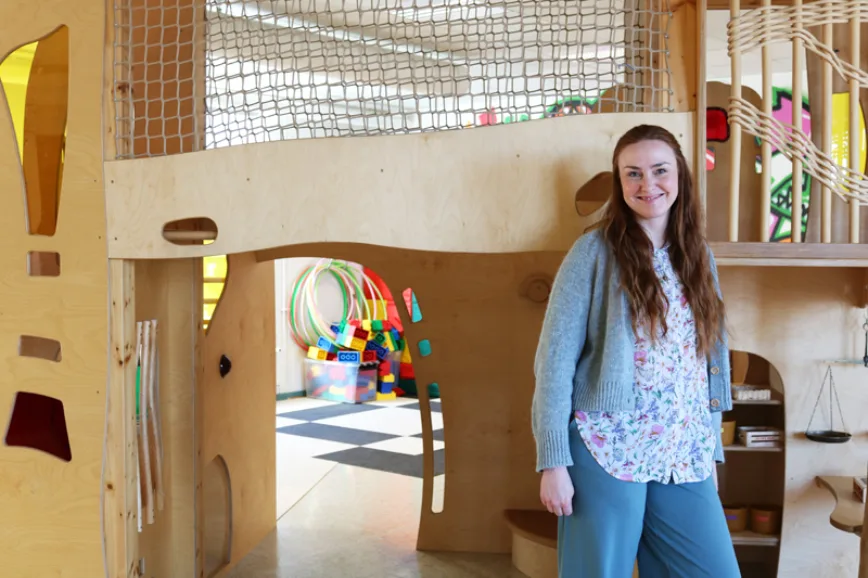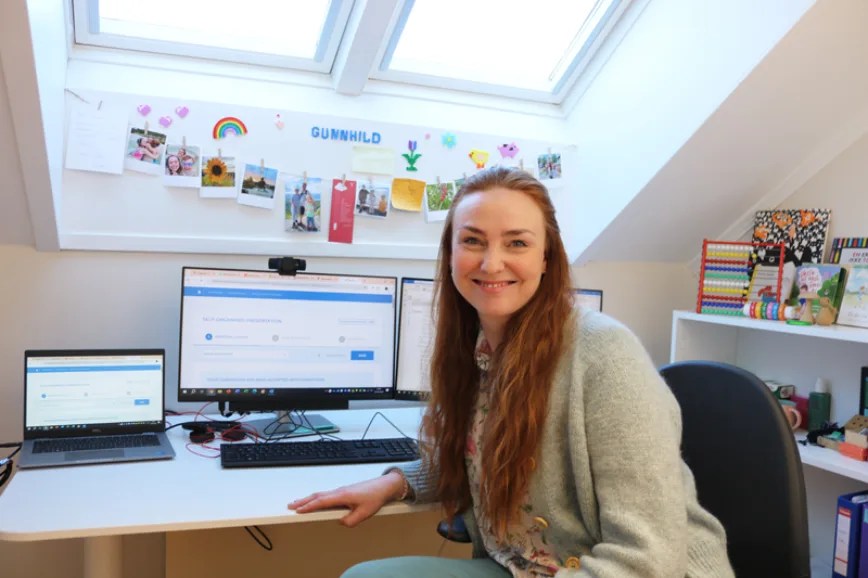- I probably made it a bit difficult for myself. I got help from a programmer and my research group at NTNU, but there is a lot to learn when you're creating a digital assessment tool. I probably wouldn't have chosen this path if I had known how much work it was in advance, but now I'm glad I did, she says.
The tool was developed and documented through the doctoral thesis "Digital assessment of early number sense. The design and validation of an assessment tool," completed at the Department of Teacher Education in January 2024. The degree includes a total of 5 articles as well as the digital tool.

Gunnhild Saksvik-Raanes from DMMH developed a tool that identifies how much mathematics preschool children have learned when they start school.
Children learn a lot of mathematics in preschool
I was a teacher for 1st and 2nd grade, and I found it difficult to get an overview of how far the students had come in reading and mathematics. I needed something that could help teachers find out what the children knew before they started school.
It turned out to be quite a lot.
Mathematics is all around us all the time, but the skills children have developed in preschool are not necessarily valued when they start school. Preschool and school need to collaborate, and we adults must see the value in all the experience they bring. If we don't meet this competence when they start school and spend time practicing things they already know, the children don't see the benefit of math education. It can become a vicious cycle where children end up not understanding the point of learning mathematics in school.
Saksvik-Raanes says there is a big difference in how preschool and school work, and that a lot of important work is done in preschool.
Children start learning mathematics as soon as they are born; we must value the skills they bring when they start school.
The challenge of assessment
The committee that evaluated the doctoral thesis described Saksvik-Raanes' work as innovative. She tackled a problem and found a solution. However, assessment is a contentious topic in the preschool context.
Even though there are many opinions about whether we should assess children's knowledge at all and in what way, we need to know where to start to help them further in the learning process. In the Nordic preschool context, we only assess when we are very concerned about a child's development. However, then we know little about what the majority can do and the challenges and knowledge of those who struggle. Perhaps they understand something when they are outside playing, but not when they are sitting at a desk in the classroom. Therefore, it is important to consider the context when we examine children's knowledge and facilitate further learning.
I find it very interesting to be involved when students have an epiphany about mathematics
As a teacher at the college, Saksvik-Raanes is focused on practice and ensuring that teaching is closely related to what happens in preschool.
When I was a student teacher myself, I didn't always see the benefit of what we were doing, and it's easy to tune out. I think it's important to bring practical examples into the teaching.
She is also focused on highlighting that mathematics is a subject many students struggle with. Some students have developed an anxiety for the subject through their own school journey.
It's sad that they have developed this fear; mathematics is an important part of mastering everyday life and professional life. If you go through school without mastering mathematics, your options become limited.
The associate professor says it's important to talk to students about their previous experiences with the subject.
They should feel confident in the subject and that it's not dangerous to explore and discover things together with the children in preschool. Being confident in one's own competence and knowing that everyone can succeed in mathematics is one of the most important things. My job is to help students see the mathematics. We find mathematics in all situations if we just have the right perspective.

- If students are to see the importance of mathematics in preschool, many need to understand it in a new way, says Associate Professor Gunnhild Saksvik-Raanes at DMMH.
I find it very interesting to be involved when students have this epiphany, when they realize that mathematics is an interesting subject and exclaim with joy: "I didn't know mathematics could be so fun!" It's very self-developing both personally and professionally for many to realize that this is something they can master. "I use it all the time; I just hadn't thought about it before."
Why should the joy of learning that children bring from preschool disappear when they come to a place that is supposed to be designed for learning?
Saksvik-Raanes hopes to further develop the tool, as many teachers are asking for it. Feedback from students who have been in primary school practice supports a continued need, but it requires a lot of work before the tool can be launched. At the same time, there are many other exciting tasks here at the college, so the way forward is uncertain.
One thing is certain, the associate professor is passionate about children and mathematics.
Children bring with them an enormous interest and curiosity for all the connections in the world around them when they start school. Unfortunately, we often see that this joy of learning disappears during the first school years. We need to ensure that children retain the passion for learning throughout their school journey, and I believe the school has a lot to learn from preschool in this regard. Why should the joy of learning that children bring from preschool disappear when they come to a place that is supposed to be designed for learning?
